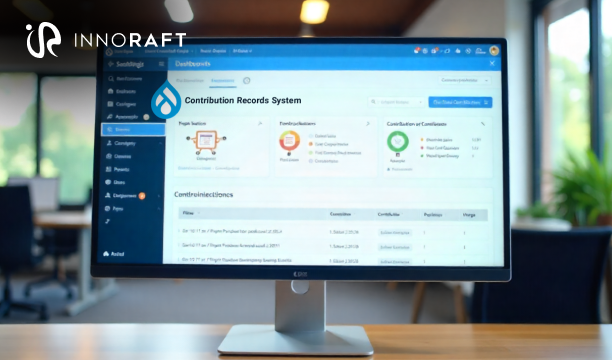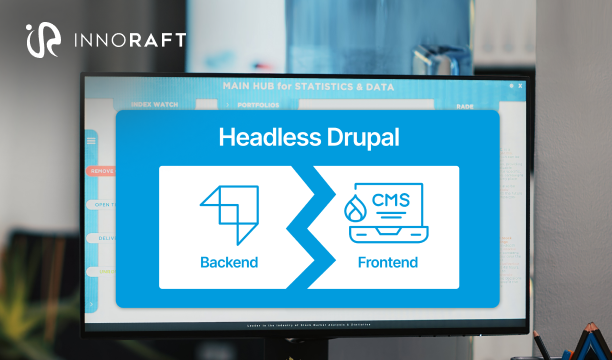AI is transforming major digital platforms, and Drupal is moving in the same direction with purpose and clarity. This shift became even more visible during the recent DrupalCon Vienna keynote, where Dries Buytaert outlined how Drupal CMS aims to thrive in an AI-driven web. His statement captured the mood across the community: “AI is the storm, but it’s also the way through it.
The message is simple. Instead of resisting AI, Drupal plans to use it as a force multiplier. Through emerging capabilities such as Drupal Canvas (for AI‑assisted visual editing), Recipes (for template‑driven site creation), and autonomous Agents, Drupal is evolving toward an AI-powered content management system grounded in practical innovation. Crucially, this model keeps editors firmly in control. Governance features, such as permissions, 'Human-in-the-Loop' review workflows, and immutable audit trails, are central to this approach, ensuring AI augments editorial standards rather than bypassing them.
This blog explores where AI stands in Drupal today and what is on the near‑term and long‑term roadmap, helping you understand how these capabilities can elevate your digital experience platform.
AI in Drupal Today (Current Capabilities)
AI integration in Drupal revolves around three major pillars: foundational Drupal AI frameworks, editor-facing tools, and emerging automation capabilities. Together, they form a practical and flexible environment that teams can start using today, with foundational pieces already stable and more advanced Drupal automation and agent patterns maturing quickly.
A. What is the Unified AI Framework Doing for Drupal Right Now?
The unified Drupal AI framework, powered by the Drupal AI module, acts as the foundational infrastructure layer for AI integrations. It serves as a vendor-agnostic abstraction layer that links Drupal with major language models such as OpenAI, Anthropic, and Gemini. Crucially, it also supports self-hosted and private LLMs (via tools like Ollama), allowing organizations with strict data sovereignty or compliance requirements to keep sensitive data within their own infrastructure.
This setup provides essential strategic agility. It allows teams to switch providers to take advantage of better pricing or performance, combine strengths from different models (e.g., using Gemini for analysis and Claude for creative writing), or experiment with new tools; all without refactoring code. As Drupal sites grow more complex, this provider flexibility ensures long-term scalability and prevents vendor lock-in.
B. What AI Tools Can Content Editors Use Immediately?
Drupal already includes a set of practical AI tools for Drupal developers, primarily through the drupal/ai module ecosystem, that streamline content workflows. These tools focus on editorial efficiency and creative support.
CKEditor + AI (The ai_ckeditor Submodule)
Once configured, editors can request writing help without leaving the text field. Using the AI Assistant inside CKEditor, you can generate content, rewrite paragraphs, summarize long sections, or adjust tone (e.g., "Make this more professional"). These capabilities reduce friction during content creation and allow users to iterate rapidly through streamlined Drupal AI integration..
AI-Enhanced Media Tools
Image handling becomes more intuitive through AI Automators that offer computer-vision powered automatic alt text generation. For teams working on accessibility, this speeds up compliance, though editors must remain the 'human in the loop' to verify accuracy. Additionally, modules like ai_media_image allow editors to generate assets directly within the Media Library using models like DALL·E, reducing dependence on external tools.
SEO Helpers & Automators
AI Automators can now be chained to analyze your content and automatically populate complex fields. This includes generating SEO-optimized meta tags, suggesting taxonomy terms, and even creating summaries based on the body text, ensuring pages are optimized for search engines before they ever go live through enhanced Drupal automation and agents.
C. How is AI Changing Automation, Workflows, and Multi-step Tasks?
AI in Drupal is going far beyond simple writing assistance. The platform is moving toward autonomous systems that can handle structured tasks and orchestration.
AI Agents & Autonomous Tasks Drupal’s Agentic Framework (available via the ai_agents module) allows site builders to create assistants capable of reasoning. Unlike simple chatbots, these agents can use "Tools" to interact with your site, showcasing the growing power of Drupal automation and agents.. Examples include:
- Taxonomy Curator: An agent that reads content and automatically assigns or creates hierarchy terms.
- Content Scraper: An agent that browses external URLs and structures the data into Drupal nodes.
(Note: The creation of Webforms is typically handled by the AI Generation tools in Drupal CMS, rather than runtime agents.)
AI Automators (Chained Workflows)
The latest iteration of AI Automators supports chained execution. This means a single content event can trigger a sequence: an image upload triggers an Alt Text generator, which triggers a caption writer, which finally triggers a translation agent. This is often orchestrated alongside the ECA (Event-Condition-Action) module for complex logic.
AI Context Control Center (CCC)
A new centralized workspace, the ai_context module, allows teams to define "Context Entities", such as brand voice, prohibition lists, or strategic goals. This acts as the governance layer, dynamically injecting these rules into every AI interaction to ensure all agents speak with one consistent voice across your artificial intelligence in CMS workflows.
Future of AI in Drupal (Roadmap & Beyond)
Drupal’s roadmap extends far beyond today’s writing assistants. The future lies in Drupal CMS (formerly Starshot), where AI will transition from an add-on to a core architectural pillar - a clear signal of the Future of AI in Drupal.
A. How Will Core Integration Improve AI Experience in Drupal?
The move toward Drupal AI 2.0 brings structural changes that improve stability, standardized tooling, and site-building experiences.
Agents Runner Consolidating into the "AI Foundation"
The Agents Runner, the logic that allows AI to perform multi-step tasks, is becoming a native part of the main ai module (AI Core). This ensures that all agentic tools (whether for content, maintenance, or search) share a shared, stable infrastructure rather than fragmented custom solutions within the Drupal AI module.
AI Translate and AI Search
Decoupling for Speed In a strategic shift, high-level features like AI Translate and AI Search are moving to dedicated project namespaces. This decoupling allows Drupal agency to leverage these tools and iterate rapidly, matching the blistering pace of LLM updates, without being slowed down by the stability requirements of the foundational API.
Drupal CMS (Starshot) & Drupal Canvas
The future of site building lies in Drupal CMS, which will feature Drupal Canvas (formerly Experience Builder) as its default visual editor, further evolving Drupal into an AI-powered content management system.
- Prompt-to-Page: The Canvas AI Assistant allows builders to describe a section ("Create a pricing table with 3 tiers") and have the system generate the components instantly.
- Recipe Recommendations: AI won't just suggest modules; it will recommend full Recipes (configuration bundles) to solve complex business problems in one click.
B. How Will AI Improve Search and Personalization in Drupal?
Drupal is moving beyond simple keyword matching toward Semantic Search that understands user intent.
AI Search & RAG (Retrieval-Augmented Generation)
The ai_search module enables Retrieval-Augmented Generation (RAG). Instead of relying on keyword density, the system chunks your content into Vector Embeddings stored in databases like Pinecone, Milvus, or PostgreSQL, providing a powerful foundation for Drupal AI integration.
This offers three critical benefits:
- Semantic Understanding: A user can search for "how to fix a broken login" and get results for "password reset protocols" even if the words don't match.
- Hallucination Control: The AI answers questions strictly based on your Drupal content, reducing the risk of false information.
- Hybrid Capabilities: Drupal can now combine traditional Keyword Search (for exact SKUs) with Vector Search (for concepts), giving users the best of both worlds.
Agentic Personalization
While full site personalization is still evolving, AI Agents are introducing Context-Aware Interactions. An agent on a university site, for example, can detect if a user is a "Student" or "Researcher" based on their query history and adjust the complexity of its answers in real-time, an early step toward deeper Drupal site personalization with AI.
C. What Will AI Mean for Developers and Site Builders?
While early features targeted content editors, the roadmap includes powerful capabilities for technical teams.
AI-Assisted Development (CLI & Code)
New tools like the ai_generation module allow developers to generate high-quality boilerplate code and scaffold modules directly from the command line (via Drush). Unlike generic coding assistants, these tools are trained on Drupal’s specific coding standards (CS) and directory structures, ensuring clean, compliant code, a major boost for AI tools for Drupal developers.
Automated Agent Evaluation (Not Just Testing)
As teams build autonomous agents, "testing" becomes harder. Drupal addresses this with AI tools for Drupal developers, such as Automated Agent Evaluation (via ai_agents_test), allowing developers to simulate thousands of user interactions to verify an agent's safety and logic before it goes live, replacing manual QA with deterministic scenarios.
Responsible AI & Governance
As AI becomes integrated, Drupal adheres to strict Responsible AI principles.
- Explainability: Through Chain of Thought Logging, admins can inspect the exact reasoning steps an agent took to reach a conclusion.
- Auditability: The ai_logging module creates immutable audit trails of every AI interaction, ensuring that organizations meet compliance standards by maintaining full traceability of machine-generated decisions.
Conclusion: What Does Drupal’s AI Future Mean for You?
The evolution of AI in Drupal has a clear purpose: Augmentation, not Replacement. AI will not replace developers or editors; it will elevate them. By handling repetitive tasks, such as generating alt tags and writing boilerplate code, AI frees teams to focus on high-value strategy.
Here are some starting points:
- Foundation: Install the drupal/ai module to explore the unified framework and configure your first LLM provider.
- Experiment: Enable the AI CKEditor plugin to see immediate editorial benefits.
- Build: Create your first No-Code Agent to automate a simple task, like tagging content.
- Future-Proof: Join the Drupal CMS (Starshot) initiative to test early builds of Drupal Canvas and the new default AI experience.
This path allows you to adopt AI at your own pace, moving from simple "assistants" to fully autonomous agents, all while staying aligned with Drupal’s secure, open-source architecture.
Is your Drupal site AI ready? Contact our experts today for site assessment and AI integration plan today!
FAQ
Frequently Asked Questions
Didn’t find what you were looking for here?





